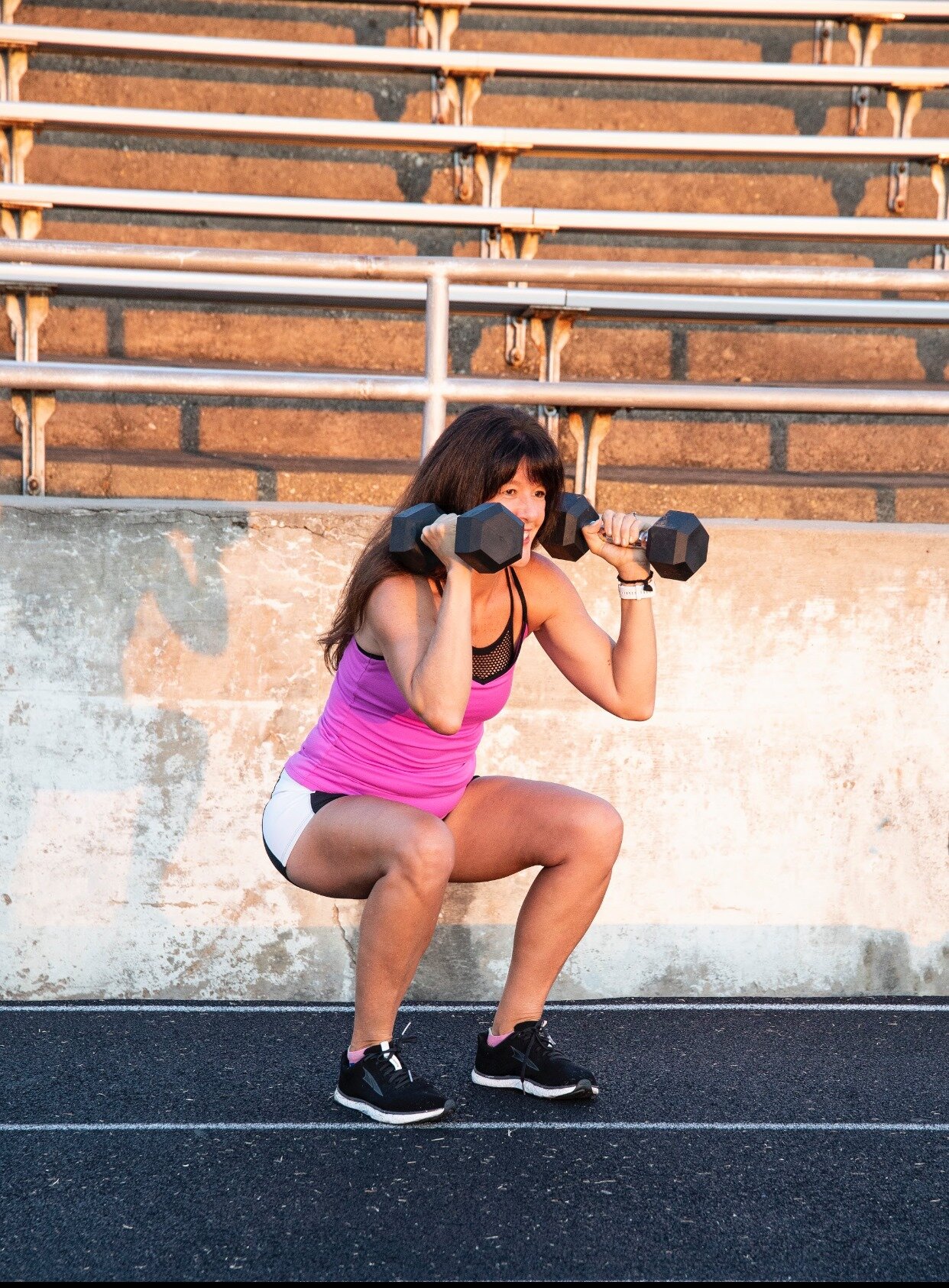There's a difference between knowing what you're supposed to do and actually doing it. You know that strength training is important for runners but how do you find the time to fit strength training into your marathon training plan? How can you fit in all the miles, strength training, your family, your job, your responsibilities and (assuming you still have one outside all of that)... your life.
WHY STRENGTH TRAINING IS IMPORTANT FOR RUNNERS
Before we get into the how let's first go over the why. Why is strength training important for runners? When we run, our bodies move through the sagittal plane (forward and backward motion). If you only run, then you are not building lateral strength in the frontal plane or rotational strength in the transverse plane. Developing strength in all planes of motion helps you avoid injury to become a stronger, well-rounded athlete.
When you don't build strength outside of running you will develop muscle imbalances. This means that the strong muscles take over for weaker muscles that aren't developed enough and causes all kinds of alignment and recruitment problems. Common running injuries like hip pain, IT band syndrome and runner's knee are caused by weak or underdeveloped muscles. Injuries occur when there is an imbalance in strength. Hamstrings can get injured if weaker than the quadriceps. Muscle weakness at the hip can cause knee injuries. The muscle stabilizes the joints, so weak muscles lead to joint injuries.
How to fit strength training into marathon training. Save to Pinterest for later.
GET YOUR PRIORITIES STRAIGHT
While strength training is important, if you are training to run a marathon, you better get your miles in or else you will be in for a world of hurt on race day. If running a marathon is your goal then running should be your first priority. You can't skimp on the training miles in order to spend hours in the gym. You can't skip your long run in order to strength train and you shouldn't attempt to put in a weight lifting session right after a hard run. So how do you make it all work?
FOCUS ON WHAT'S IMPORTANT
Strength training for body builders or power lifters is very different than strength training for runners. Runners need to focus on developing hip/glutes/core strength that includes rotational and lateral movements.
Runners will also do well to develop unilateral strength, which means you work one side at a time, like single leg deadlifts and lunges. When you run you are repeatedly balancing on one leg at a time, so building single leg and hip strength can immensely benefit your running.
Don't waste a lot of time doing bench presses and bicep curls because these exercises won't help improve your running like a pushup, squat or deadlift will. Focus on compound exercises that targets the hips/core and hamstrings to build runner-specific strength.
Don't underestimate the importance of upper body strength for runners because strong arms, shoulders and back power your stride and helps you maintain a good running form over long distances.
BE EFFICIENT
You know what you need to focus on, now you need to do it efficiently because you have a lot of miles to run and not a lot of time. Structure your workouts for the most benefit in the shortest period of time. Bodybuilders schedule long rest periods in between their sets because this is optimal for hypertrophy (bigger muscle size), but we are not trying to build giant muscles. Cut out the rest periods for a more efficient workout.
Runners can get their strength training in the shortest amount of time by structuring exercises in an interval format. Move from one exercise to the next with little to no rest between exercises. For example you may do a set of single leg deadlifts on each leg, a set of pushups, a set of lunges on each leg then a straight arm plank to side plank on each side. Do 8-12 reps of each exercise one after another without rest and then repeat the circuit two more times. In the end you will have completed 3 sets of 8-12 reps of each exercise without wasting any time staring at the clock between sets. A workout like this won't take much time at all. You could schedule it after an easy run or on an off running day.
Try this five minute hip strengthening workout before you hit the road for your next run or do it in the morning when you roll out of bed.
FORGET ALL-OR-NOTHING
A little bit of strength training is always better than none. You don't need to spend an hour in the gym four to five times a week to see the benefits of strength training. Who has time for that? If you can get 10 minutes in every day, that is better than nothing, especially when you are just starting. I work to get at least two 30 minute full-body strength training sessions in a week with shorter 5-10 minute flexibility, balance, or activation exercises to supplement throughout the week. This is enough to see the benefits of strength training.
TIPS FOR FITTING IT ALL IN
1. Schedule your running days first. Get the miles in for your marathon training.
2. Take at least one full rest day from running and strength training every week.
3. Don't schedule hard effort runs and heavy strength training on the same day.
4. Don't schedule running & strength training on the same day if it will total more than an hour and a half. After that amount of time your training sessions will suffer and the potential for injury is higher than the benefit.
5. Don't schedule a hard strength training session the day before your long run.
EXAMPLE SCHEDULE WITH RUNNING & STRENGTH TRAINING
MONDAY HIPS + RUN
TUESDAY 30 MINUTE STRENGTH TRAINING
WEDNESDAY INTERVAL OR HILL RUN
THURSDAY 30 MINUTE STRENGTH TRAINING (+ EASY RUN LESS THAN 30 MINUTES IF DESIRED)
FRIDAY HIPS + RUN
SATURDAY LONG RUN
SUNDAY REST DAY/RECOVER WALK
Runners who strength train are stronger, faster, more well-rounded athletes that are less-prone to injury. What's not to love about that?
Like this post? It helps me when you share with your friends and followers.














When people talk about performance-enhancing drugs, they aren’t usually talking about caffeine, but if used correctly, caffeine can improve your running performance. In this blog post, I’ll teach you how to use caffeine to boost your performance. for key workouts or race day.